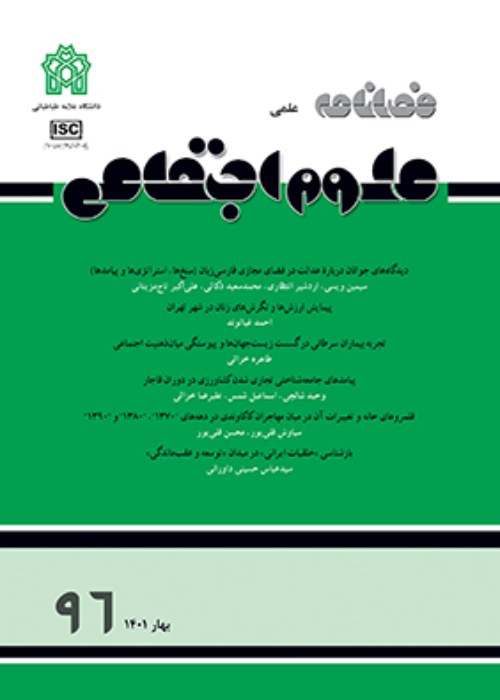Reflection of religious teachings in the Iranian culture and non-yokefellow other-help foundations
Author(s):
Abstract:
Whereas muscular moves of the body are considered as cultural phenomenon according to Marcel Maus, participatory and anti-participatory behaviors of human beings which range from sacrificing cooperation to war and selfish quarrels are undoubtedly considered as cultural.On the other hand, there is a longstanding mutual relation between cultures and religious teachings. The Iranian culture is one of the rare world cultures which have entered the realm of monotheistic religions for several thousand years. These teachings have been influential both in quantitative and qualitative aspects of cooperation in this culture. One can assume that in line with the transition from religions believing in embodied gods to those believing in transcendent gods, objective and opportunistic participation has been shifted toward purer forms of cooperation which are free from materialistic and profit seeking purposes and tends toward status seeking, satisfactory and otherworldly purposes.It seems that special characteristics of helping in the Iranian culture and the manifestation of religious teachings in this culture have provided the ground for the Iranian's expectations to transcend self-help and mutual help (aspired by western social activists of cooperatives) and tend towards other-help cooperation. Part of this other-help cooperation has been common in the everyday life of Iranians across the history and another part of it has been especially manifested in the tradition of endowment (both in Zoroastrian and Islam).Non-yokefellow other-help foundations across history have encompassed a wide range of humanitarian and philanthropic goals other than mere religious ones and include various needs of human beings. The range of these goals has even sometimes extended to animals and plants. Reflection in these embodied forms of helps could also be useful from a theoretical perspective for the recent history of cooperation and lack of cooperation in the Iranian culture up to the spring of 2010.
Language:
Persian
Published:
Journal of Social Sciences, Volume:16 Issue: 3, 2009
Page:
1
magiran.com/p785146
دانلود و مطالعه متن این مقاله با یکی از روشهای زیر امکان پذیر است:
اشتراک شخصی
با عضویت و پرداخت آنلاین حق اشتراک یکساله به مبلغ 1,390,000ريال میتوانید 70 عنوان مطلب دانلود کنید!
اشتراک سازمانی
به کتابخانه دانشگاه یا محل کار خود پیشنهاد کنید تا اشتراک سازمانی این پایگاه را برای دسترسی نامحدود همه کاربران به متن مطالب تهیه نمایند!
توجه!
- حق عضویت دریافتی صرف حمایت از نشریات عضو و نگهداری، تکمیل و توسعه مگیران میشود.
- پرداخت حق اشتراک و دانلود مقالات اجازه بازنشر آن در سایر رسانههای چاپی و دیجیتال را به کاربر نمیدهد.
In order to view content subscription is required
Personal subscription
Subscribe magiran.com for 70 € euros via PayPal and download 70 articles during a year.
Organization subscription
Please contact us to subscribe your university or library for unlimited access!


